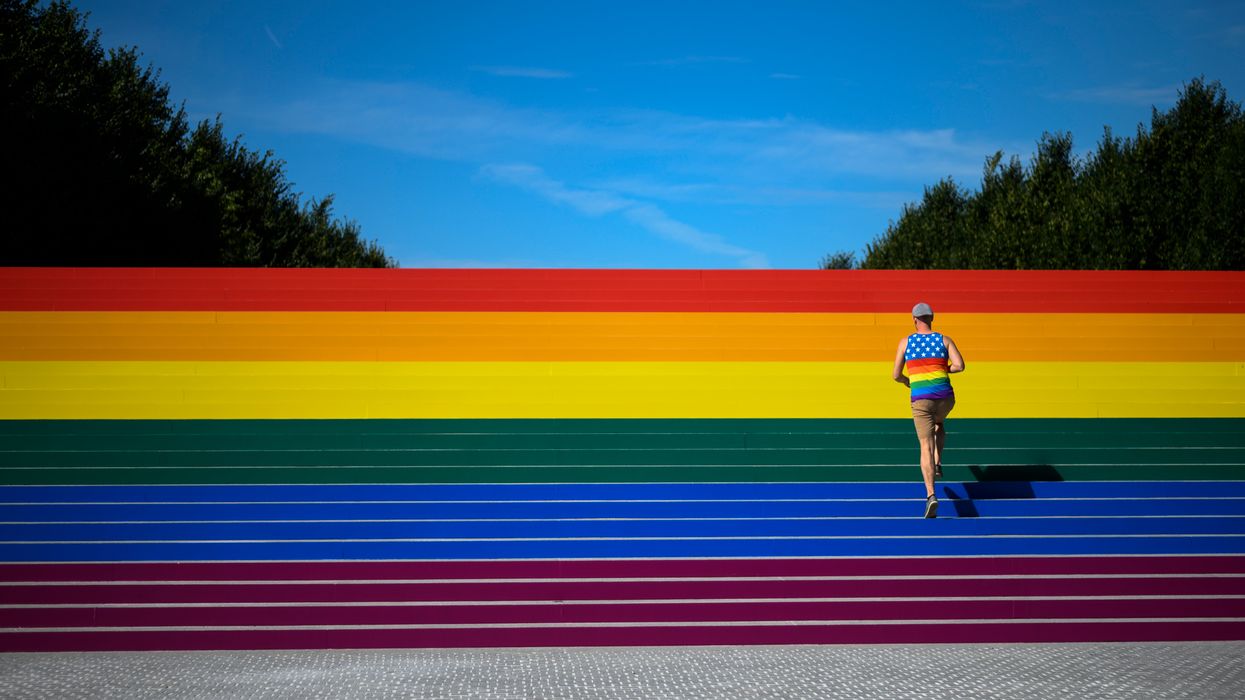
Photo credit should read JOHANNES EISELE/AFP/Getty Images

Interesting take
Slate contributor Jim Farber says that he came out as gay in the 1970s and finds it hard to fit into today's ever-evolving sexual society revolving around fluidity.
Farber's article, "Categorically Gay," appeared at Slate on Monday with the subhead, "For queer people who grew up in an era where rigid identities were essential, today's fluidity can feel like their history is washing out with the tide."
Farber wrote the article to commemorate Pride Month and kicked it off with a personal anecdote about a long-married female friend who confessed that she was actually "queer" and not heterosexual, like her husband believed.
"Because I like her, and very much despise confrontation, I didn't press her on this," he wrote. "Instead I smiled tightly and chirped, 'Welcome to the club!'"
Farber went on to explain this wasn't the first time something of this nature has happened to him.
He explained that a 22-year-old acquaintance also previously told him that despite being "straight" and never sexually experimenting with another woman, she was beginning to have thoughts about female friends.
"She followed this several months later by reporting that she had fallen in love with a man," he recalled. "Eight months later, they married. Yet she still wanted to affix the Q word to herself, in her case to signify 'questioning.'"
Farber admitted that he does not necessarily have a problem with this type of sexual evolution — "intellectually," anyway.
"But, down below, where emotions wrestle with the inescapable ghosts of our pasts, I have a serious problem with it," he wrote.
Farber explained that such interactions leave him feeling "bafflement, estrangement, belittlement, irrelevance, and — because of all that repressing [of such emotions] — rage."
Farber turned to his older, gay peers to discuss the feelings.
"Nearly every one of them mirrored my feelings precisely, before sharing similar stories of colleagues and acquaintances in their own lives," he confided.
He went on to explain that many people who came out in the 1970s and '80s "are struggling to reconcile our excitement over the openness of the age of sexual and gender fluidity with the past we experienced, when sexual rigidity proved an indispensable tool."
"Back then," he lamented, "it wasn't a matter of 'questioning,' but of asserting, not of exploring, but of declaring."
"[T]hat history very much matters," Farber insisted, due in part to the idea that "today's fluidity" owes a debt to "yesterday's rigidity."
Farber admitted that "many gay-assertive people" — himself included — three and four decades ago looked at people who identified as bisexual with "suspicion, if not scorn."
"It wasn't because we didn't believe that many were telling the truth about their experience," he offered. "It was because so many people that I, for one, knew actually identified as gay had been exploiting the 'bi' term as a sexual caveat to avoid the risks of coming out completely."
Farber said that he believed many people who considered themselves as "bisexual" were simply using it as a way to take baby steps into the LGBTQ community.
"The mounting frustration over this, a feeling supremely intensified by the AIDS crisis, erupted in the vitriol of the 'outing' movement of the early '90s," he wrote. "While I was against 'outing' at the time — believing it only boldfaced the message of shame — from this perspective I'm glad it happened."
Farber explained that he believed the "outing" resulted in a greater level of acceptance that trickled down from prominent figures to even neighbors around the block.
"That, among many other elements, led to an exponential confidence in the movement, to the point where, today, it feels free enough to add as many letters, applications, and variations to its roster as it likes," he added, but with a caveat.
"Wonderful as this is in many ways, today's openness isn't without consequences," he warned. "If nearly any progressively minded person can find some way to identify as queer, what, exactly, does the term even mean? When I hear about fluidity in that context, it sounds like something made to wash away gay history — my history — drowning it in inclusiveness to broaden its clout."
Farber concluded by voicing his hopes that the expanding LGBTQ "generation gap" and their varying sexual experiences is able to unite all people within the community.
"[I]f we're going to engage them effectively and honestly, we'll need the experiences of the past to inform the movement's new attitudes and actions," he concluded. "It's the only way to bridge the widening LGBTQ generation gap and unite us. I only hope the age of fluidity will be open enough to accept it."